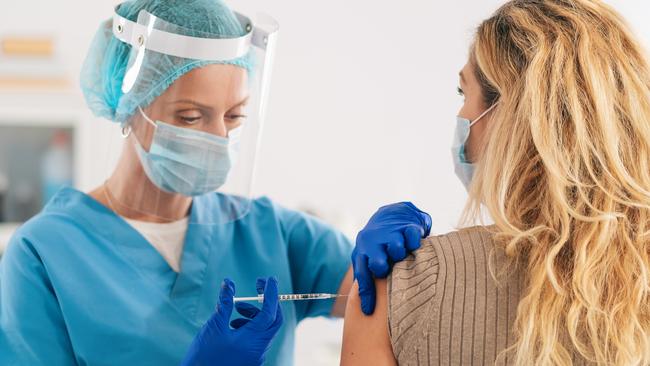Growing despair may lift Covid-19 jab uptake
Covid-19 outbreaks and state lockdowns have soured the national mood, with young Australians reporting high levels of psychological distress and more people saying our way of life will never return to normal.

Covid-19 outbreaks and state lockdowns have soured the national mood, with young Australians reporting high levels of psychological distress and more people saying our way of life will never return to normal.
An ABS household impacts of Covid-19 survey released on Wednesday also shows people have reduced their safety precautions, such as handwashing and wearing masks, over the course of the pandemic, but are now more likely to get vaccinated as perceptions of infection risk change in the community.
Last month, 26 per cent of those surveyed reported that life would take more than a year to return to normal, compared with 14 per cent in November.
ABS head of household surveys David Zago said 16 per cent reported that life would never return to normal, compared with 11 per cent in November.
As well, 20 per cent of respondents had experienced high or very high levels of psychological distress in the past four weeks, including 30 per cent of people aged 18 to 34, in results that were similar to survey results reported in November and March.
Associate director of the ANU Centre for Social Research and Methods Nicholas Biddle said “the evidence in Australia and around the world is that lockdowns have a greater negative effect on the mental health and wellbeing of young people than older people”.
“The longer the effects of Covid continue, the less likely people think life will return to pre-pandemic times,” Professor Biddle said. “Yet there are positives, including increased trust in government and new ways of working, so people may be expressing a desire for change from earlier times.”
The ABS used the Kessler Psychological Distress Scale (K10), which asks about feelings associated with anxiety and depression, including sadness, worthlessness, nervousness, and restlessness.
Prior to the recent infection outbreaks in Victoria and Greater Sydney, an ANU poll in April reported an improvement in mental health, with average psychological distress lower than it was pre-pandemic, although one in 10 people were experiencing severe psychological distress according to the non-specific Kessler-6 (K6) measure.
Professor Biddle said where Australians’ experiences differed from those in other countries was that older Australians had higher levels of mental health and wellbeing, most likely due to the suppression of the virus here.
On Tuesday, Scott Morrison announced more spending for mental health in the relief package for NSW. “As we found in the Victorian lockdown, the provision of additional mental health support was absolutely critical,” the Prime Minister said.
From March last year to January this year, 11.5 million Medical Benefits Scheme-subsidised mental health-related services were provided.
The longitudinal ABS survey of 3414 people was taken between June 11 and 20, after the end of the Victorian lockdown and as restrictions on movement began in inner areas of Sydney. As shown in Victoria, virus outbreaks are a nudge to vaccine acceptance.
In June, 73 per cent of Australians agreed or strongly agreed that they would get a Covid-19 vaccine when it becomes available and was recommended for them, an increase from 68 per cent from May, with men more emphatic than women, and 90 per cent of those aged over 70 responding in this way.
Only 11 per cent disagreed or strongly disagreed that they would get a vaccine, compared with 13 per cent in May. Of those least likely to get a vaccine, either opposed or indifferent, half said they were concerned about the potential side effects.
Of those who had not yet received a jab, 15 per cent said they wanted a different vaccine to what was available to them, 11 per cent said the waiting time to get an appointment was too long, and 8 per cent said they did not know if they were eligible.
UNSW social scientist in infectious diseases Holly Seale said “we need to do everything we can to have people activated to get a vaccine when available and shut down the misunderstanding around eligibility, including extending the eligibility checker’s language beyond English.”
“Up until now, some people were happy to delay getting the vaccine. We’re seeing a shift in vaccine acceptance because of perceptions around necessity and infection severity,” Associate Professor Seale said.
She added: “The age spectrum of people now in ICU, with more younger people there, is changing conversations.”
Of Australians who had received at least one dose, 90 per cent in the ABS survey reported that it was very easy or moderately easy to get one.
As of Tuesday, 9.5 million vaccine doses had been administered, with one-third of the population aged 16 and over receiving at least one shot and 12 per cent fully vaccinated.
This week the Morrison government launched a new phase of its $41m vaccination advertising campaign.
A health department spokesman said the new ads, including a graphic portrayal of a young woman breathing via a ventilator, “will be supported by other targeted communication activities to provide information on the rollout and the importance of being vaccinated”.
“The campaign connects people to trusted sources of information on how and where to receive the vaccine and stay Covid safe,” he said.
On Tuesday, the Australian Technical Advisory Group on Immunisation urged people aged under 60 in coronavirus outbreak zones to consider being vaccinated with AstraZeneca if they did not have immediate access to Pfizer.
As well, the expert group has also recommended a shorter interval of between four and eight weeks between first and second doses of AstraZeneca for those in Delta-variant outbreak zones.




To join the conversation, please log in. Don't have an account? Register
Join the conversation, you are commenting as Logout